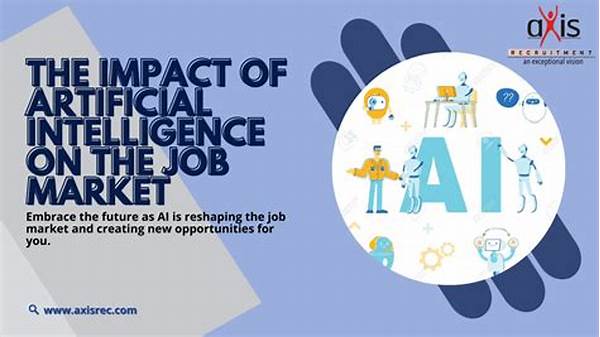Artificial Intelligence (AI) is transforming the job market at an unprecedented pace, creating a dynamic shift that both intrigues and intimidates professionals across industries. As AI technologies continue their rapid advancement, they offer a wealth of opportunities and challenges. This transformation can be likened to a suspenseful thriller where AI plays the protagonist, shaking up traditional roles and reshaping the jobs landscape. It’s a game-changer, a revolutionary force that beckons workers to adapt or risk obsolescence.
In today’s fast-paced world, AI’s role in the job market is like a rollercoaster – thrilling, unpredictable, and occasionally terrifying. Technologies such as machine learning, robotics, and automation are no longer part of a futuristic vision but are our current reality. Companies across the globe are harnessing the power of AI to enhance productivity and efficiency, delivering services faster and with precision. However, this raises a crucial question: Are our current workforce skills adequate in this age of intelligent machines?
From an economic standpoint, the impact of artificial intelligence on the job market cannot be understated. Although AI is responsible for the displacement of certain job roles, it also has the potential to create new avenues for employment. Enterprising businesses are investing in AI not only as a means to streamline processes but also to unlock creative potential and foster novel ideas. Hence, AI is not solely about replacing people; it’s about evolving them.
It’s time to debunk some myths. While AI applications might make some jobs redundant, the emphasis is on collaboration. Humans and AI working in tandem can yield extraordinary outcomes, much like a superhero duo operating in perfect sync. As professionals, recognizing the tools AI offers can be empowering, transforming the AI narrative from one of fear to one of promise and opportunity.
Navigating the AI-Driven Job Market
During a casual chat with my friend Jane, who works in human resources, she mentioned, “AI is like a new kid on the block. Everyone’s curious but cautious about making friends because they’re unsure if they’ll fit in.” Her comment shed light on the underlying apprehension yet undeniable excitement that the impact of artificial intelligence on the job market brings.
Opportunities and Challenges
The AI invasion in the job market brings two sides of a coin – challenge and opportunity. On one side, employees fear being replaced by machines capable of performing tasks with superhuman speed and accuracy. On the flip side, organizations and employees who embrace AI can experience growth and unlock potential previously thought unattainable. So, what makes some wary and others embrace the AI wave with open arms? This curiosity leads to deeper discussions and creative solutions for the workforce to thrive alongside AI advancements.
Understanding the logic behind the deployment of AI and its capacitive potential offers a pragmatic lens perfect for professionals seeking to harness its power to boost their careers. It’s akin to opening Pandora’s box of innovation, where those who adapt and evolve stand to benefit significantly.
Key Aspects of the Impact of Artificial Intelligence on the Job Market
Purpose of AI in the Job Market
The purpose of AI in reshaping the job market extends beyond mere mechanization and efficiencies. It signifies a dynamic shift towards more innovative future workspaces. AI’s ability to handle massive datasets and glean actionable insights contributes to improved decision-making processes within organizations, potentially redefining success factors. Incorporating AI into everyday work routines translates into an exciting blend of machine precision with human intuition.
The advocacy for embracing AI emphasizes the importance of education and training. Encouraging employees to pursue AI literacy and technological fluency fosters resilience in the face of change, much like equipping a superhero with advanced gadgetry to defeat novel adversaries. By nurturing a culture of continuous learning, businesses drive empowerment and innovation, instilling confidence rather than fear in their workforce.
Furthermore, ethical considerations surrounding AI’s implementation challenge industries to think deeply about the balance between progress and societal impact. Holding companies accountable extends beyond numbers; it’s about making responsible decisions that cultivate trust among stakeholders. Just like in any epic story, the resolution comes with a solid moral foundation.
The Ripple Effects of AI on Employment
A report by a research firm indicated that by 2030, AI could displace millions of jobs, yet simultaneously create millions of others. The importance of preparing for this paradigm shift is paramount. Companies, employees, and educational institutions must collaborate to close the skills gap and ensure a seamless transition. For instance, partnerships promoting AI-driven certifications can provide pathways for workforce adaptation.
Throughout this landscape, AI stands not as an antagonist but as a collaborative ally. Consider the potential of AI complementing human abilities, turning complex challenges into manageable tasks. How does this integration play out in real life? Imagine a team of professionals leveraging AI to analyze market trends rapidly, making informed decisions that minimize risks while maximizing growth prospects. AI becomes the stagehand, setting the backdrop for humans, the leading actors, to shine.
As the impact of artificial intelligence on the job market expands, consumer expectations also evolve. Society demands transparency and seeks reassurance that AI interventions are implemented ethically. The call for fairness and inclusivity drives businesses to innovate responsibly, paving the way for an equitable future.
The Future Landscape of AI and Jobs
Descriptive Insights into AI’s Job Market Impact
In an age dominated by rapid technological advancements, Artificial Intelligence stands poised to redefine the paradigms of occupational existence. What began as a quest for enhanced efficiency has now evolved into an exploration of uncharted territories where imagination blends with algorithmic precision. In this binary world, where data reigns supreme, AI offers a canvas for redefining job scopes and societal contributions.
The mantra for navigating these futuristic avenues centers on proactive adaptation. Organizations committed to investing in human capital through tech training initiatives and adaptive leadership strategies seem well-positioned to ride the AI wave. The narrative centers around forging a future that seamlessly integrates AI advancements with human expertise, aspiring towards a unified goal: progress with purpose.

